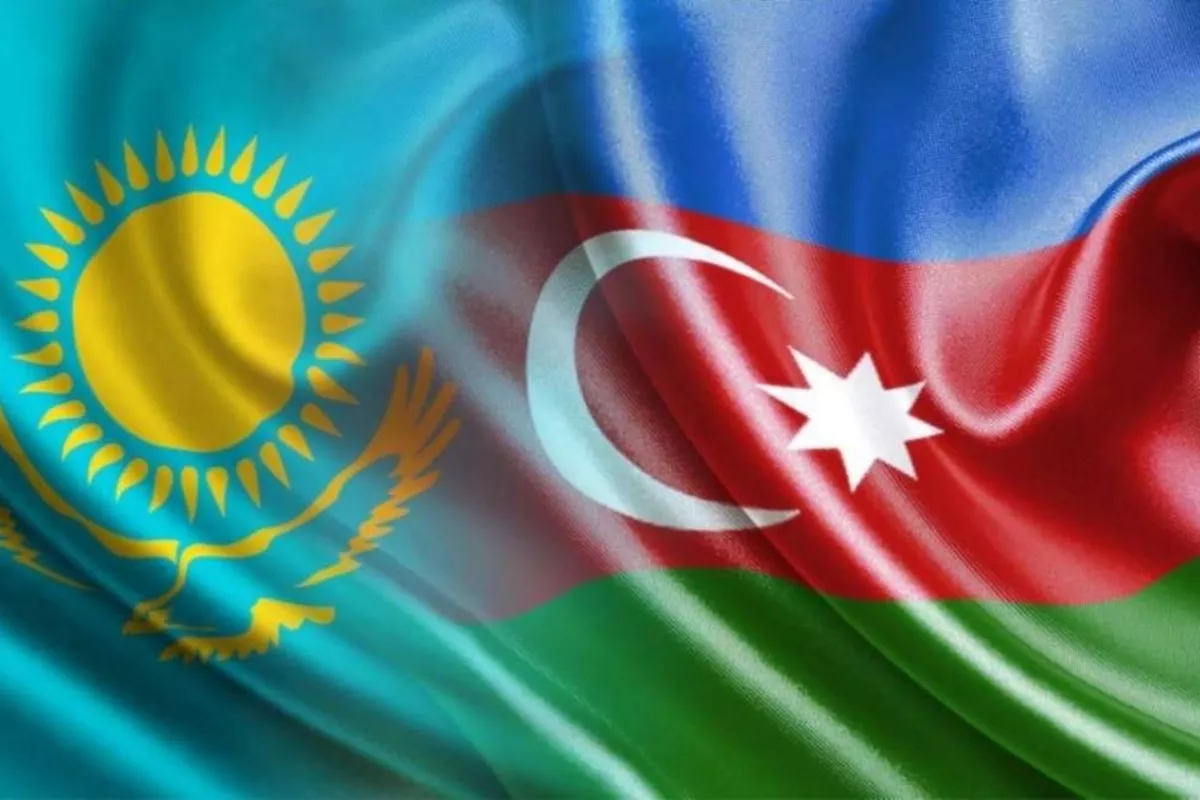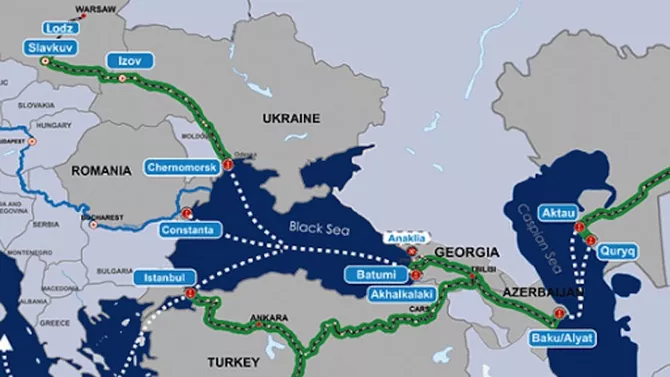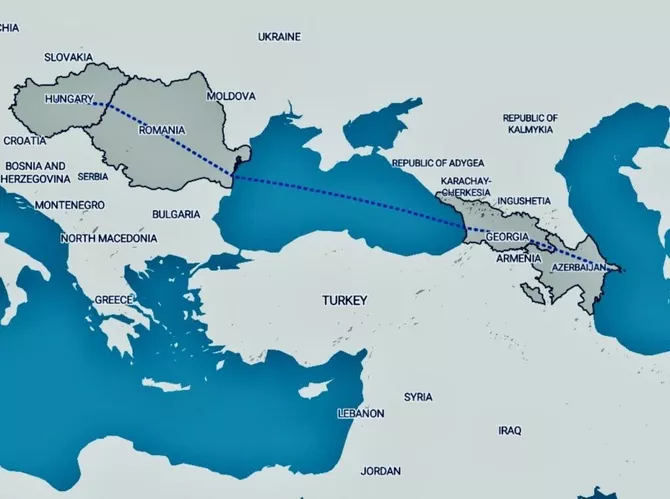
photo: Kazinform
The partnership between Azerbaijan and Kazakhstan has evolved far beyond conventional diplomacy - it is rapidly becoming one of the defining forces shaping Eurasia’s geopolitical and economic landscape. On the eve of his official visit to Kazakhstan, President of Azerbaijan Ilham Aliyev gave an exclusive interview to Kazinform, where he emphasized that the relationship between Baku and Astana has reached a qualitatively new level. The deepening strategic ties between the two Caspian nations now encompass not only energy and transport, but also digital infrastructure, green transition, and cultural exchange.
Over the past several years, Azerbaijan and Kazakhstan have proven that pragmatic cooperation built on mutual trust can yield tangible results. In 2024, bilateral trade turnover reached $470 million - 50 percent higher than the previous year. During the first eight months of 2025, mutual trade exceeded $547 million, showing more than a fourfold increase. This growth has been driven by the expansion of the Middle Corridor - the Trans-Caspian International Transport Route - and by the modernization of logistics infrastructure across both countries.

photo: Eurasia Review
The investment dimension of cooperation has also gained strong momentum. Azerbaijani investments in Kazakhstan’s economy total $225 million, while Kazakh investments in Azerbaijan stand at $136 million. These figures reflect a long-term confidence that underpins the strategic partnership, where both sides view each other not merely as neighbors, but as integral allies in shaping a new transport and energy order across the Eurasian continent.
The Middle Corridor itself has turned into a critical artery for East-West trade, offering a reliable alternative to traditional routes. In 2024, total cargo turnover between the two countries exceeded 3.5 million tons, representing a 20 percent increase compared to the previous year. The Roadmap adopted in Aktau for 2022-2027 aims to synchronize modernization efforts in Azerbaijan, Kazakhstan, and Georgia - from unifying tariffs to building logistics hubs and enhancing efficiency.
This transformation is not limited to transport logistics. At the 21st session of the Intergovernmental Commission between Azerbaijan and Kazakhstan, held in Baku, both sides reaffirmed their commitment to give the Middle Corridor higher institutional status. They agreed to focus on eliminating bottlenecks, simplifying customs procedures, and optimizing cargo flows. By 2024, 287 container trains had already passed through this route, while in the first nine months of 2025, volumes grew by an additional 39 percent.
The strategic vision behind this effort is shared by both leaders. Speaking at the 12th Summit of the Organization of Turkic States in Gabala, Kazakh President Kassym-Jomart Tokayev described the Middle Corridor as the backbone of the Eurasian transport network and called on Turkic countries to modernize ports, railways, and aviation hubs. Later, at the 7th International Transport and Logistics Forum New Silk Way in Almaty, the railway administrations of Kazakhstan, Azerbaijan, and Georgia signed a joint action plan to reduce transit time and simplify border crossings.
No less significant is the energy cooperation between Baku and Astana. On August 6 in Astana, the energy ministers of Azerbaijan, Kazakhstan, and Uzbekistan signed a protocol on integrating their national power systems. The agreement lays the foundation for a new green energy partnership that will link the Caspian basin to Europe. According to the plan, a high-voltage submarine cable will be built along the Caspian seabed, connecting the energy systems of the three countries and enabling the export of renewable electricity. The feasibility study is being prepared by the Italian company CESI, with a joint venture of national energy firms expected to implement the project.

photo: Jam-news.net
This ambitious initiative will connect Kazakhstan and other Central Asian states to the Black Sea Energy corridor - a project signed in Bucharest in December 2022 by Azerbaijan, Georgia, Romania, and Hungary. The 1,195-kilometer subsea power line with a capacity of 1 GW will deliver renewable energy from the Caspian region to European markets, solidifying Azerbaijan’s position as a major energy transit hub and giving Kazakhstan a new export channel to the West.
Equally transformative is the Digital Silk Way - a joint telecommunications project between Azerbaijan and Kazakhstan. The two countries are laying a 380-kilometer fiber-optic cable along the Caspian seabed between Aktau and Sumgayit. With a planned capacity of 400 terabits per second and an investment exceeding $50 million, the project will connect the digital ecosystems of the South Caucasus and Central Asia, enhancing data security and regional independence. In June, AzerTelecom and Kazakhtelecom completed seabed engineering studies, and the project is scheduled for completion by the end of 2026.
The energy partnership continues to deepen. According to Azerbaijan’s Ministry of Energy, the transit capacity for Kazakh oil through the Baku-Tbilisi-Ceyhan (BTC) pipeline will reach 7 million tons per year by 2027. Since 2023, 3.4 million tons of Kazakh oil have already been transported via BTC. SOCAR and KazMunayGas maintain a five-year agreement signed in 2022 to ship 1.5 million tons annually, following upgrades to the Sangachal terminal. In 2024, the pipeline carried 1.4 million tons of Kazakh oil, compared to just over 1 million tons in 2023, and the figure is expected to reach 1.5 million tons in 2025. On January 27, 2025, Kazakhstan sent its first oil tanker from the Kashagan field to Azerbaijan - a symbolic milestone underscoring the growing energy alliance between the two nations.
For Kazakhstan, expanding exports via the BTC pipeline means reducing dependency on northern routes and achieving greater energy sovereignty. For Azerbaijan, it reinforces its role as a reliable bridge between the Caspian and global markets - a nation capable of linking Asia and Europe through multiple layers of energy, digital, and transport cooperation.
The partnership between Azerbaijan and Kazakhstan stands as a model of pragmatic regionalism - based not on ideology, but on mutual benefit and long-term vision. Both countries understand that the 21st century belongs to those who build connections, not divisions. The Middle Corridor, the Digital Silk Way, and the shared commitment to green energy mark the beginning of a new phase in Eurasian integration - one in which Baku and Astana will continue to play a central, unifying role.
Share on social media